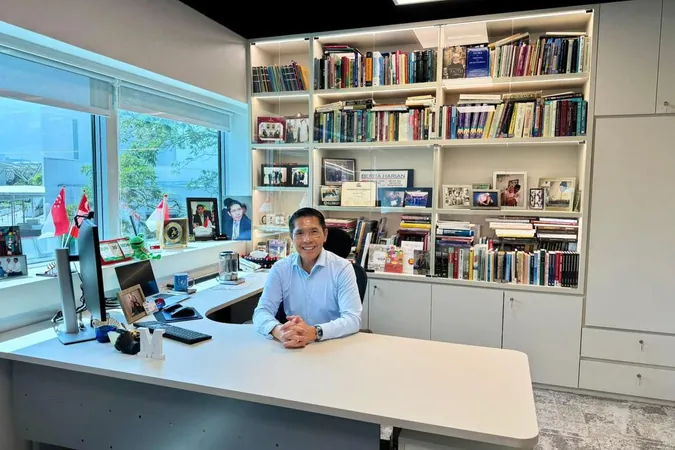
Decline in Literacy Proficiency Among Singapore's Older Adults: Urgent Steps Needed to Reverse the Trend!
2025-01-08
Author: Daniel
Decline in Literacy Proficiency Among Singapore's Older Adults: Urgent Steps Needed to Reverse the Trend!
SINGAPORE: A concerning decline in literacy proficiency among older adults in Singapore is largely attributed to skills atrophy and obsolescence, Minister for Education Chan Chun Sing revealed in a recent parliamentary session. This revelation comes on the heels of a study released by the Organisation for Economic Cooperation and Development (OECD) which indicates that Singapore's adult literacy levels now trail behind the OECD average.
The Programme for the International Assessment of Adult Competencies (PIAAC), which has been conducted twice—once from 2014 to 2015 and again from 2022 to 2023—assessed around 5,000 participants aged 16 to 65. The findings illustrate a worrying trend: literacy skills in adults sharply decline after the age of 35, a trajectory that continues into older age.
While many countries have reported similar declines in literacy proficiency, Singapore's situation is particularly alarming. Mr. Chan described two primary factors fueling this decline: the "atrophy effect," where skills diminish once individuals exit formal education and enter the workforce, and the "obsolescence effect," which occurs as workplace demands rapidly change due to technological advancements and shifting market needs.
Moreover, the minister pointed out the "cohort effect," noting that younger generations enjoy significantly improved educational opportunities compared to their predecessors, likely exacerbating the gap in literacy skills among different age groups.
Members of Parliament have raised pressing questions about whether the Ministry of Education has strategies to curb the decline in literacy levels, especially as it relates to employment prospects for workers over 35. In response, Mr. Chan underscored the importance of continuous upskilling and reskilling throughout one’s career. He emphasized that the workplace competency isn't solely defined by literacy skills measured in the OECD study, as various other factors—including job-specific skills, employment rates, and wage levels—play crucial roles in maintaining the competitive edge of Singapore’s workforce.
To combat the atrophy and obsolescence of skills, Mr. Chan reiterated the government’s commitment to investing heavily in lifelong education and training initiatives such as SkillsFuture, which provides financial credits for individuals to pursue further education and training. He urged individuals to actively take charge of their learning journeys and for employers to prioritize the development of their employees by aligning training programs with their business goals.
The discussion also included suggestions for collaboration with local publishers and literacy organizations, highlighting a need to foster a stronger reading culture. Mr. Chan acknowledged the challenge posed by the modern media landscape, filled with various distractions, while stressing the importance of encouraging Singaporeans to engage in reading and learning beyond traditional schooling.
"We either use it, hone it, or we lose it," Mr. Chan cautioned, underscoring the universal truth that applies to all skills developed over time. Without proactive measures to maintain and enhance literacy, Singapore risks further declines in proficiency among its aging population, making it essential to adopt holistic approaches that encompass education, engagement, and employer involvement.
As we look to the future, the message is clear: addressing literacy decline isn't just about preserving skills; it's about ensuring lifelong learning becomes an integral part of Singapore's cultural and professional fabric. Stay tuned as we unravel more insights on this critical issue and what the government plans to implement next!




 Brasil (PT)
Brasil (PT)
 Canada (EN)
Canada (EN)
 Chile (ES)
Chile (ES)
 Česko (CS)
Česko (CS)
 대한민국 (KO)
대한민국 (KO)
 España (ES)
España (ES)
 France (FR)
France (FR)
 Hong Kong (EN)
Hong Kong (EN)
 Italia (IT)
Italia (IT)
 日本 (JA)
日本 (JA)
 Magyarország (HU)
Magyarország (HU)
 Norge (NO)
Norge (NO)
 Polska (PL)
Polska (PL)
 Schweiz (DE)
Schweiz (DE)
 Singapore (EN)
Singapore (EN)
 Sverige (SV)
Sverige (SV)
 Suomi (FI)
Suomi (FI)
 Türkiye (TR)
Türkiye (TR)
 الإمارات العربية المتحدة (AR)
الإمارات العربية المتحدة (AR)